This Week in the Budget; Share Your Vision for Seattle Parks by 10/13; Seattle Leading the Way in Spurring Economic Recovery; Behavioral Health Leaders’ Summit; West Seattle Bridge Tour; 5 Year Anniversary of the Mobile Integrated Health Program; East Precinct OPA Report; Resolution Supporting the Decriminalization of Entheogens; Habitat for Humanity South Park Home Dedication; The 4th Annual Seattle/Pacific Northwest Black College Expo™; Virtual Office Hours
This Week in the Budget
This week there are no meetings of the Select Budget Committee, as Councilmembers and staff comb through and consider the Proposed 2022 Budget.
The first public hearing is Tuesday, October 12th at 5:30 p.m. Sign up begins at 3:30 p.m. at bit.ly/council-comment.

This is the first of three public hearings. The other two are on November 10th and 18th. Public comment is also taken during the morning session of each Budget Committee meeting.

On October 13th, 14th and 15th, the Budget Committee is scheduled to meet for “Issue Identification.” Issue Identification is the stage in the budget process when Council Central Staff identify potential issues with the Mayor’s proposed budget that are likely to be of significant interest to the Council and the public, as well as possible options to change the proposed budget. Councilmembers can verbally share potential amendment ideas at this stage too.
Meetings will include morning and afternoon sessions beginning at 9:30 a.m. and 2 p.m. Here’s the schedule:
October 13: morning session: overview of 2022 budget; afternoon: Department of Education and Early Learning (DEEL), Office of Economic Development (OED)
October 14: morning session: Office of Planning and Community Development (OPCD), Human Services and Community-Led Investments; afternoon: homelessness
October 15: morning session: Seattle Department of Transportation (SDOT), alternatives to police response & the criminal legal system; afternoon: Police Department (SPD)
Share Your Vision for Seattle Parks by 10/13
It’s your last call to participate in Seattle Parks & Recreation’s online open house. Parks is collecting community feedback on their plans for pandemic and economic recovery, and what you want to see at our parks, open spaces, and community centers in the coming years. Share your ideas by 10/13.
Seattle Leading the Way in Spurring Economic Recovery
A new Brookings Institute report finds that Seattle is leading the way in quickly distributing federal relief to boost household and economic recovery. Leaders of the 20 largest American cities have committed only 18% of the flexible funds they received from the American Rescue Plan Act (ARPA). Compare that to Seattle, where Council approved the Seattle Rescue Plan this summer, which committed half of our available funding. This fall, Council will consider plans to commit the rest of our ARPA funding.
Investing in our economic recovery is essential – a lesson learned during the Great Recession of 2008. An analysis by the Center for American Progress found that economic recovery was swifter and unemployment lower in the 30 states that increased government spending, compared to the 20 states that embraced austerity and cut spending. The Brookings reports concludes, “Cities that got out of the gate with comprehensive plans bridging high-level goals with project-level details—such as Boston, Buffalo, St. Louis, and Seattle—offer models for how other cities can approach this historic opportunity.”
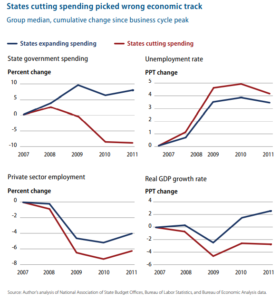
Behavioral Health Leaders’ Summit
On Tuesday, I participated in a summit convened by Downtown Emergency Services Center (DESC) to discuss the urgent need for a stronger system of support for people experiencing behavioral health crisis, including:
- Discussion of HB 1310 and what legislative changes at state and local levels would resolve concerns about the circumstances in which law enforcement can assist in behavioral health crisis events.
- Clarification about what instructions have been provided to law enforcement officers about HB 1310. SPD Chief Diaz has put this public statement out, but we know that there are still inconsistency in statements from officers about what they can and cannot do.
- Identification and immediate implementation of options and resources for creation of additional non-law enforcement interventions to send to behavioral health crisis events.
Leaders of approximately fifteen local behavioral health providers shared their stories of clients struggling with the effects of the pandemic, and a behavioral health system that is straining to serve them with inadequate resources. King County Executive Dow Constantine, Mayor Jenny Durkan, City Council President Lorena González, King County Council Chair Claudia Balducci, King County Prosecutor Dan Satterberg, King County Sherriff Mitzi Johanknecht, and others were in attendance to hear the concerns and discuss solutions.
I will be pursuing funding and policy changes to support their recommendations, which include:
- Expand places for people in crisis to receive immediate support, post-crisis follow-up services, and community-based behavioral health services
- Stabilize the behavioral health sector workforce
- Clarify when law enforcement involvement in behavioral health crises is necessary and possible.
West Seattle Bridge Tour
In anticipation of construction of the bridge repair starting in full swing next month, I joined SDOT and others for a tour of the West Seattle Bridge earlier on Thursday the 7th.
Here I am in the interior of the bridge, with the post-tensioning cables used in the stabilization of the bridge at the bottom, and cameras that monitor the interior condition of the bridge at the top.
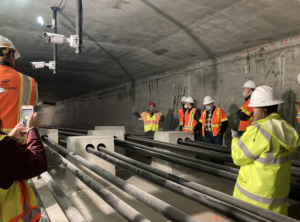
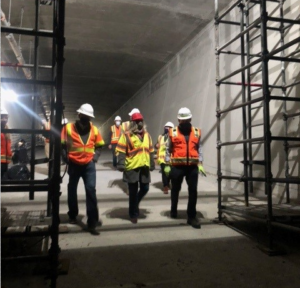
(photos: SDOT)
The West Seattle Bridge Community Task Force will hold a public meeting next week, with updates.
5 Year Anniversary of the Mobile Integrated Health Program

This week marked the five year anniversary of the launch of the Mobile Integrated Health Program. I first wrote about the expansion of the Mobile Integrated Health Program here, when former Councilmember Bagshaw, and the Seattle Firefighters, proposed an expansion of Mobile Integrated Health to include Health One, so more 911 calls could be directed towards providers that are better able to assist individuals in need. You can read what I wrote about the latest Health One expansion here. We expect another Health One expansion this fall with funds the Council provided in last year’s budget.
The Mobile Integrated Health Program has led to saving the City time and resources, freeing up the time of fire fighters and police officers so they can respond to the calls that only they can respond to, and ensuring that residents are connected most efficiently with the services they need.
East Precinct OPA Report
The Office of Police Accountability (OPA) published a report last week on the June 8, 2020 decision to close the East Precinct. Following a late-June 2020 discussion in my Public Safety and Human Services Committee, I asked OPA to determine whether the decision for all SPD staff to leave the East Precinct building was in accordance with SPD policy and procedures. I later sent the following questions, with the OPA considered a complaint for investigation:
- What are the SPD policies and procedures to authorize vacating a precinct?
- What are the conditions, according to SPD policies and procedures, under which SPD can authorize vacating a precinct?
- Who, according to policies and procedures, authorizes SPD staff to vacate a precinct?
- In this instance, who directed SPD staff to vacate the East precinct?
- In this instance, did the person or persons who directed SPD staff to vacate the East precinct have the authority to do so?
- In this instance, did the conditions exist, according to SPD policies and procedures, for an authorized SPD personnel to order vacating the East Precinct?
- The Chief of Police and Mayor Jenny Durkan have stated that they did not direct staff to vacate the East Precinct, if not were either of them aware that staff had been directed to vacate the East Precinct?
- If there is a determination that no personnel directed or authorized SPD personnel to vacate the East Precinct, what is the violation of policies and procedures of individual officers if they did so without direction or authorization?
A few Seattle residents made similar requests to the OPA.
The investigation resulted in findings of “not sustained” for four separate lines of inquiry, meaning OPA found no misconduct. These findings, I believe, came up short in addressing the questions I asked OPA to review.
First of all, the OPA is reinforcing the narrative that the East Precinct was abandoned because of the specific threat to the East Precinct. But there is nothing in the official Incident Action Plan, linked document here, that suggests that FBI threats led to the decision to abandon the precinct. Further, NE#2 (“Named Employee” in OPA terminology) also “stated that SPD had received information from the FBI that protest groups were going to target government buildings, and that SPD believed that the East Precinct was vulnerable to the type of destruction inflicted on Minneapolis’s Third Precinct.” This suggests that the FBI intelligence was generalized, not specific to the East Precinct.
In July 2020, I wrote about that here: “The decision to barricade the East Precinct was attributed to what was described as a “credible threat” from the FBI to the East Precinct. My conversations with Chief Best have revealed that the FBI threat was not specific to the East Precinct; rather, it appears to have been a generalized assessment of threat to “police and government structures” in Portland, San Francisco, and Seattle.“
If the OPA is, in a large way, relying on a generalized FBI threat in its findings that no policy was violated with the decision to evacuate the building, how does this – for instance – address my 6/23 question asking whether the “conditions exist, according to SPD policies and procedures, for an authorized SPD personnel to order vacating the East Precinct?” There are apparently no policies, for a decision of this magnitude, to base the evacuation on an assessment of specific threat to a particular facility. Shouldn’t OPA recommend, though a Management Action Recommendation (MAR), that SPD create a policy describing the conditions under which SPD can authorize vacating a precinct? See more about OPA MAR’s here: Policy Recommendations – OPA | seattle.gov
Secondly, I am concerned about the “Remaining Factual Issue” on pages 19-20 about whether the decision was made independently of Chief Best and that Chief Best reports that she was notified after the fact.
Chief Best has said that the decision was made by others and that she directed them to not abandon the East Precinct. Further in the OPA interview she reported that “she empowered her command staff to make decisions without always consulting her.” On the other hand the Incident Commander, in his first interview with the OPA said that her, “never discussed the evacuation of personnel” with Chief Best. In his second interview he said he told Chief Best during a phone call “exactly what we were going to do” and that he would never make as significant a decision as evacuating all personnel from the East Precinct “without running by the chief exactly what it was that we were going to do,” and his recollection of the response was, “Not specific words, but she concurred with the response, and I think she understood it.”
This unresolved “remaining factual issue” seems to be at the crux of some of the questions I asked on June 23, some of which remain unanswered. Again, if there are no policies that define who can make this decision and under what authority, and there remains lingering question of how this particular decision was made on June 8th, shouldn’t OPA recommend, though a Management Action Recommendation (MAR), that SPD create a policy?
Resolution Supporting the Decriminalization of Entheogens
On Monday, the Council voted unanimously to adopt a resolution “declaring that the investigation, arrest, and prosecution of anyone engaging in entheogen-related activities should be among The City of Seattle’s lowest law enforcement priorities and stating the Council’s support for full decriminalization of these activities.” Entheogens – also known as psychedelics – have recently been shown to benefit individuals suffering depression, anxiety, post-traumatic stress, grief, and intergenerational trauma, and underlying issues associated with problematic substance use. These and other physical and mental conditions are plaguing many communities, which has been exacerbated by the impact of COVID-19.
The Council passed this resolution after recommendations from the Overdose Emergency Innovative Recovery (OEIR) task force, which has been convened and led by VOCAL-WA. In early June the Council sent a letter to the task force requesting the:
“examination of public policy governing psychedelic medicines, commonly referred to as ‘entheogens’. The OEIR Task Force work will expand efforts for solving the local overdose crisis, drug user health inequities, and region-wide safety and health by proposing and evaluating recommendations in order to build evidence and enhance practices on innovations in recovery and person-centered interventions. Given the potential of entheogens as treatments for substance addiction and behavioral mental health conditions, we believe this topic is a suitable addition to the Task Force workplan.”
The task force released recommendations that in part state: “Municipalities, in the State of Washington and elsewhere, that have independent ordinance criminalizing psychedelics should repeal them, and those that don’t should direct their law enforcement agencies, local prosecutors and municipal courts to deprioritize enforcement and should public communicate this as municipal policy.”
It is the current enforcement practice of the Seattle Police Department (SPD) to neither detain nor arrest individuals, nor to confiscate drugs from individuals, solely for suspected violations or violations of Section 69.50.4013 of the Revised Code of Washington (RCW), which is applicable to the possession of entheogens as controlled substances in the meaning of RCW 69.50.101(g).
Many other jurisdictions have decriminalized some of all entheogens, including: Oakland, California; Santa Cruz, California; Denver, Colorado; Ann Arbor, Michigan; Washington, D.C.; the State of Oregon; and Portugal, Brazil, Jamaica, and the Netherlands have also decriminalized some or all entheogens.
Habitat for Humanity South Park Home Dedication
Last Saturday I attended a home dedication for Habitat for Humanity in South Park. The housing project was, in part, funded through the Seattle Office of Housing and consisted of 13 new homes built on two lots that previously had only one house. The two lots were zoned what’s called Residential Small Lot; a zoning classification that replaced “single family zoning” located within Urban Villages in 2019 after the Council’s passage of the Mandatory Housing Affordability (MHA)program.
Home ownership is key to building intergenerational wealth and a key driver of the racial wealth gap. During the Council’s passage of the JumpStart revenue, I sponsored an amendment that sets aside approximately $6 million annually for permanently affordable homeownership opportunities available to households earning up to 80% of Area Median Income. The funds are reserved for this type of housing development, households at risk of displacement from their communities, or who have faced barriers to homeownership due to past discriminatory policies and practices such as redlining and restrictive racial covenants. Between funds newly available in Jump Start, funds available through the Housing Levy, and funds that are collected through MHA, the city funding available for homeownership has tripled in recent years.
At the event I met some new homeowners and learned about what Habitat for Humanity is doing in the Seattle area to build more affordable housing. I want to thank Habitat for Humanity for inviting me out and for all their work. Thanks as well to the Office of Housing! Congratulations to Blue Print Capital for the award that they received for innovative housing development.
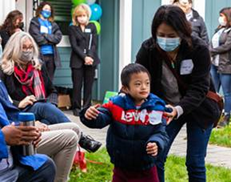
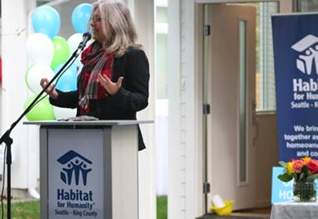
The 4th Annual Seattle/Pacific Northwest Black College Expo™
It’s free and hosted virtually on Friday, October 15, 2021 from 2:30 pm to 4:30 pm as an online experience for students to gain access to colleges, highlighting historically black colleges and universities (HBCUs), and other educational institutions.
In an effort to support and connect with students in the Seattle/Pacific Northwest area, National College Resources Foundation has partnered with Seattle Public School District and Renton School District.
The Seattle/Pacific Northwest Black College Expo is an opportunity for students to get accepted on the spot, get their college application Fees waived and receive scholarships. This event will help high school seniors and college transfer students looking to transfer to a four-year college.
In addition to getting connected to college recruiters, students will have access to informative seminars and workshops which include but are not limited to How to Find Money for College, Why Attend an HBCU, 411 for the Student Athlete, and How to Start a Business.
To register, please visit: www.ncrfoundation.org or call 877-427-4100.
Black College Expo™ (BCE) a trademark program of National College Resources Foundation (NCRF), a 501c3 non-profit organization that functions daily as a full-service student outreach program in various schools. BCE was founded in 1999 by Dr. Theresa Price as a vital link between minorities and college admissions. NCRF’s mission is to curtail high school dropout rate and increase degree and/or certificate enrollment among underserved, underrepresented, at risk, low resource, and homeless and foster students. NCRF’s vision is to close the gap in educational achievement, workforce and economic disparities with the goal to end racism and racial inequalities.

Virtual Office Hours
On Friday October 29, I will be hosting virtual office hours between 2pm and 6pm, with the last meeting of the day beginning at 5:30pm.
Due to the nature of virtual office hours, please contact my scheduler Alex Clardy (alex.clardy@seattle.gov) in order to receive the call-in information and schedule a time.
Additionally, here is a list of my tentatively scheduled office hours which will continue as virtual office hours until indicated otherwise. These are subject to change.
- Friday, December 17, 2021
Posted: October 8th, 2021 under Councilmember Herbold, COVID-19, Education, Homelessness, Human Services, Office of Police Accountability, Parks and Recreation, Police Department, Public Health, Seattle Public Utliities, Transportation
Tags: Bridge, District 1, SDOT, transit, West Seattle, West Seattle Bridge


